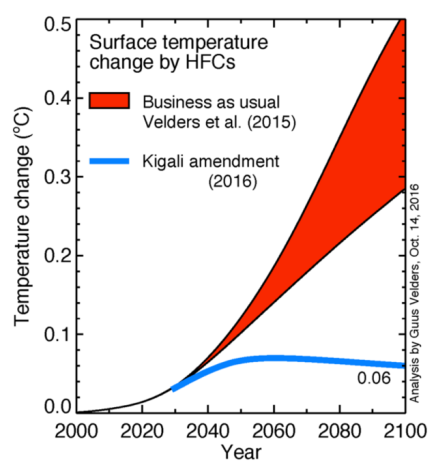Climate change progress has just gained increased momentum. Beginning in 2019, the most affluent countries and economies, including the United States and the European Union, will decrease their usage of Hydrofluorocarbons (HFCs). The agreement stems from the Montreal Protocol. It is under this treaty that over 140 countries signed the Kigali Amendment, which is the deal that will aim to phase down the global warming pollutants.
In the words of US Secretary of State John Kerry, who extensively aided in the formation of the deal, “It’s a monumental step forward, that addresses the needs of individual nations but it will give us the opportunity to reduce the warming of the planet by an entire half a degree centigrade”.
NRDC recently reported “a new analysis by Dr. Guus Velders and colleagues projects that the Kigali amendment will avoid nearly 90 percent of the temperature increase that HFCs could have caused.”

You’re probably thinking how great and wonderful all of this is. But, there’s also the possibility that you have never heard of Hydrofluorocarbons. Well, fear not, because we’re here to give you a quick breakdown.
HFCs are composed of hydrogen, fluorine, and carbon. They are predominantly used as refrigerants. HFCs are also found in air conditioners and aerosol cans. These gases are most commonly referred to as “super greenhouse gases” because of two main reasons: we use too much of them and they have enormous potential for dramatic increases in temperature. A combination of these two factors means that the benefits of reducing other greenhouse gases, such as carbon dioxide, could be severely undermined.
The Montreal Protocol was adopted in 1987 and put in place to preserve the ozone layer by gradually phasing out the many substances responsible for ozone depletion. Hence, the introduction of HFCs as refrigerants by the chemical industry as the protocol has now almost entirely diminished the gases predecessor, Chlorofluorocarbons (CFCs). Even though CO2 attracts most of the spotlight when it comes to reporting on greenhouse gases, HFCs are in fact 3,830 times more powerful and endure for up to 14 years.
Which is why this agreement carries such enormous significance. The world has united to collectively tackle the threat of climate change. This is a great example of major leaders taking real action on the biggest challenge to face modern society. Now, it’s up to us to spread information such as this in order to better inform the sceptics and denialists. To echo Joe Biden in 2015, denying climate change at this point is like “denying gravity”.
If we missed anything important or if you’d like to know more on a particular aspect of this post, let us know in the comments below.

YES! We need to reduce the use of those harmful pollutants before we become extinct!!! Wouldn’t we rather prolong life on our planet instead of contaminating our atmosphere with damaging chemical substances (Can I get an amen)
LikeLiked by 1 person
Amen!
LikeLike
Awkward moment when we know we are destroying our planet but do nothing about it
LikeLiked by 1 person
Yes, it’s terrible that we continue to have politicians and ordinary citizens that purposely deny the dangers of doing nothing about the changing climate. But, the Kigali Amendment represents a big step forward. We are slowly but surely headed in the right direction with this deal.
LikeLike
It’s bittersweet when powerful changes like this are made, knowing that it’s almost too late for a single agreement to make much difference. If people hadn’t been denying for ridiculous, narrow-minded reasons for the past 20 or 30 years, perhaps we could have made these changes much earlier and we wouldn’t be where we are today!
LikeLiked by 1 person
You’re exactly right. It always takes society a long time to be acutely aware of the severity of a particular issue, especially an environmental one. We still have a long way to go.
LikeLike
To be honest, I have to say that I did not pay attention to climate change as I cannot obviously ‘see’ it everyday, but through your post, I have to say i made a big mistake! Combating climate change is an objective not only for us but also for the future of mankind.
LikeLiked by 1 person
Yes, the main problem is that some people in some parts of the world are not directly impacted. The visibility of climate change determines the level of care people have for the issue. We are glad you were able to realise the severity of not acting on climate change.
LikeLiked by 1 person